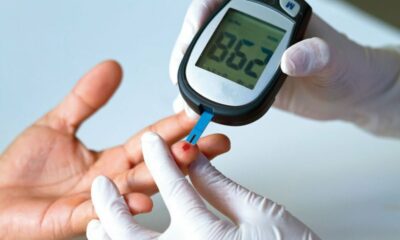Maintaining a healthy smile is crucial for everyone, but it becomes even more important for people with diabetes. Diabetes can significantly impact oral health, increasing the risk of various dental problems. This guide equips you with valuable information and practical tips to ensure proper dental care and prevent diabetes-related oral health complications.
Understanding the Connection: Diabetes and Oral Health
Diabetes affects how your body uses blood sugar (glucose) for energy. Chronically high blood sugar levels can weaken your immune system and impair blood circulation, creating an environment conducive to oral health problems. Here’s a closer look at the connection:
- Increased Risk of Gum Disease: Diabetes significantly increases the risk of gingivitis (inflammation of the gums) and periodontitis (severe gum infection that damages bone and tissues surrounding the teeth).
- Slow Healing: High blood sugar levels can impair wound healing, making it harder for your mouth to heal after dental procedures or oral injuries.
- Fungal Infections: Thrush, a fungal infection that causes white patches on the tongue and inner cheeks, is more common in people with diabetes due to changes in the oral environment.
- Dry Mouth: Diabetes can contribute to dry mouth, which reduces saliva production. Saliva plays a vital role in washing away bacteria, fighting infection, and keeping the mouth moist. Dry mouth can increase the risk of tooth decay and gum disease.
Warning Signs: Recognizing Oral Health Problems
Early detection and treatment of oral health problems are essential for diabetics. Here are some warning signs to watch out for:
- Red, Swollen, or Bleeding Gums: These are early signs of gingivitis. If left untreated, they can progress to periodontitis.
- Loose Teeth: Periodontitis can damage the bone and tissues supporting your teeth, leading to loose teeth.
- Persistent Bad Breath (Halitosis): Gum disease and poor oral hygiene can contribute to bad breath.
- Receding Gums: This exposes the root surface of your teeth, which is more sensitive and prone to decay.
- Mouth Pain or Tenderness: Pain or discomfort in your mouth can indicate various problems, such as gum disease, tooth decay, or oral thrush.
- Slow Healing of Mouth Sores: If cuts or sores in your mouth take longer than usual to heal, it could be a sign of uncontrolled diabetes.
Taking Charge: Essential Dental Care Practices for Diabetics
By adopting a consistent and comprehensive dental care routine, you can significantly reduce your risk of oral health problems. Here are key practices to integrate:
- Brushing Twice Daily: Use a soft-bristled toothbrush and fluoride toothpaste to brush your teeth for at least two minutes, twice a day (morning and night). Pay particular attention to the gum line, where plaque tends to accumulate.
- Flossing Daily: Flossing removes plaque and food particles from between your teeth, where brushing can’t reach. Floss gently to avoid irritating your gums.
- Control Your Blood Sugar: Maintaining good blood sugar control is the most critical step in preventing diabetes-related oral health problems. Work with your doctor to manage your blood sugar levels effectively.
- Schedule Regular Dental Checkups: Visit your dentist at least twice a year for professional cleanings and checkups. This allows them to identify and address potential problems early on.
- Quit Smoking: Smoking significantly increases the risk of gum disease and other oral health complications. Quitting smoking is one of the best things you can do for your overall and oral health.
- Maintain a Healthy Diet: Limit sugary and processed foods, which can contribute to tooth decay. Focus on a balanced diet rich in fruits, vegetables, and whole grains to support your overall health and oral health.
- Drink Plenty of Water: Staying hydrated helps keep your mouth moist and reduces the risk of dry mouth.
- Tell Your Dentist About Your Diabetes: Inform your dentist about your diabetes diagnosis and any medications you’re taking. This helps them tailor your dental care plan accordingly.
Addressing Specific Concerns: Dry Mouth and Oral Thrush
Dry mouth and oral thrush are common concerns for diabetics. Here are some tips to manage them:
- Dry Mouth:
- Sip water frequently throughout the day.
- Use sugar-free lozenges or gum to stimulate saliva production.
- Talk to your dentist about products specifically designed to combat dry mouth.
- Oral Thrush:
- Practice good oral hygiene to reduce fungal growth.
- Rinse your mouth with an antifungal mouthwash as prescribed by your dentist.
- Maintain good blood sugar control to prevent recurrence.
Building a Smile that Lasts: Long-Term Oral Health Strategies
Beyond daily practices, here are some long-term strategies to ensure lasting oral health:
- Partner with Your Dental Team: Develop a strong relationship with your dentist and hygienist. They can provide personalized recommendations and adjust your care plan as needed.
- Stay Informed: Educate yourself about diabetes and its impact on oral health. Several online resources and support groups cater specifically to diabetics.
- Manage Stress: Chronic stress can affect overall health, including oral health. Practice relaxation techniques like yoga, meditation, or deep breathing to manage stress effectively.
- Consider Advanced Dental Care: In some cases, advanced dental procedures might be necessary to address complications of diabetes-related oral health problems. Discuss options with your dentist if needed.
Remember: Taking care of your oral health is an essential part of managing your diabetes. By prioritizing good oral hygiene habits, maintaining blood sugar control, and working with your dental team, you can prevent complications and maintain a healthy, beautiful smile for years to come.
Disclaimer: This information is not a substitute for professional medical advice. Always consult your doctor and dentist for diagnosis and treatment plans.

 Diabetology1 week ago
Diabetology1 week ago
 Diabetology1 week ago
Diabetology1 week ago
 Diabetology1 week ago
Diabetology1 week ago
 Diabetology1 week ago
Diabetology1 week ago
 Diabetology6 days ago
Diabetology6 days ago
 Diabetology1 week ago
Diabetology1 week ago
 Diabetology3 days ago
Diabetology3 days ago
 Diabetology3 days ago
Diabetology3 days ago










